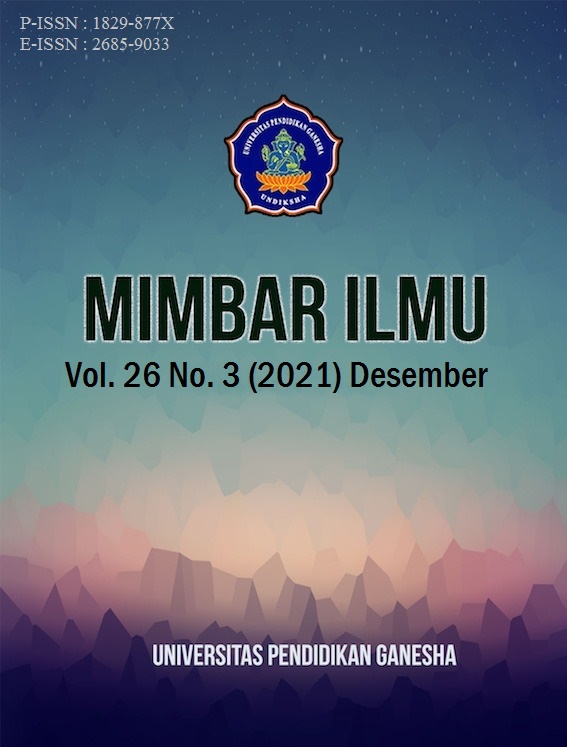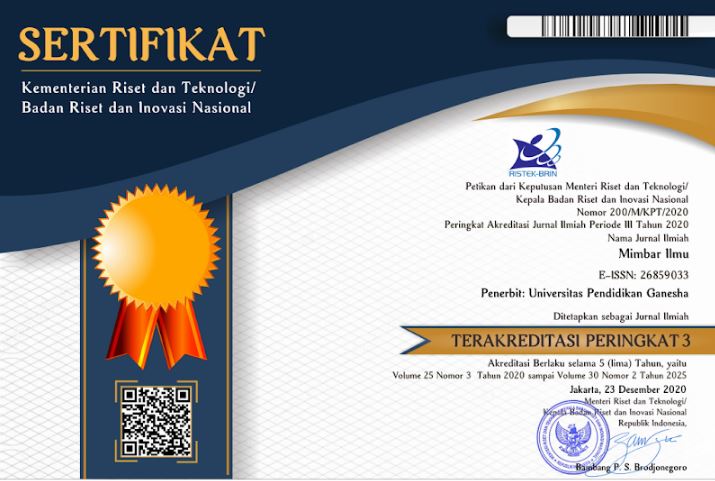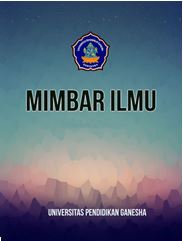Model Guided Discovery Learning Berorientasi Pembelajaran Abad 21 Bermuatan Tri Kaya Parisudha
DOI:
https://doi.org/10.23887/mi.v26i3.39893Kata Kunci:
Pembelajaran Abad 21, Guided Discovery, Tri Kaya ParisudhaAbstrak
Pihak guru tidak dapat memastikan seluruh siswa mampu belajar daring dengan baik atau dengan kata lain kualitas belajar daring tidak dapat berjalan seoptimal pembelajaran tatap muka. Tujuan penelitian ini yaitu mengembangkan model guided discovery berorientasi pembelajaran Abad 21 bermuatan Tri Kaya Parisudha. Penelitian ini merupakan penelitian pengembangan desain dan produk (Design and Development) dengan menggunakan Model ADDIE (Analysis, Design, Development, Implementation, Evaluation). Subjek pada penelitian ini terdiri atas 2 orang ahli, 5 orang mahasiswa, dan 5 orang guru sekolah dasar. Metode yang digunakan untuk mengumpulkan data yaitu observasi, wawancara, dan kuesioner. Instrumen yang diguankan untuk mengumpulkan data yaitu kuesioner. Teknik yang digunakan untuk menganalisis data yaitu deskriptif kualitatif dan kuantitatif. Hasil penelitian yaitu model guided discovery berorientasi pembelajaran abad 21 bermuatan Tri Kaya Parisudha secara empiris telah menunjukkan validitasnya baik berdasarkan hasil ahli bahasa, ahli konten, respon mahasiswa, maupun respon guru SD yang memberikan penilaian pada kategori sangat baik. Dapat disimpulkan bahwa model guided discovery berorientasi pembelajaran abad 21 bermuatan Tri Kaya Parisudha layak diterapkan dalam pembelajaran. Implikasi penelitian ini yaitu model guided discovery berorientasi pembelajaran abad 21 bermuatan Tri Kaya Parisudha dapat membangun karakter siswa.
Referensi
Agnies zka Bates. (2019). Character education and the ‘priority of recognition. Cambrid Ge Journal of Educatio N, 49(6), 695–710. https://doi.org/10.1080/0305764X.2019.1590529.
Alatas, F., & Sakina, W. H. (2019). Guided Discovery Berbantuan Virtual Lab untuk Meningkatkan Keterampilan Proses Sains dan Sikap Ilmiah. JIPVA (Jurnal Pendidikan IPA Veteran), 3(2), 138–148. https://doi.org/10.31331/jipva.v3i2.864.
Alshammari, M. T. (2020). Evaluation of gamification in e-learning systems for elementary school students. TEM Journal, 9(2). https://doi.org/10.18421/TEM92-51.
Amin, I., Yousaf, A., Walia, S., & Bashir, M. (2021). What Shapes E-Learning Effectiveness among Tourism Education Students? An Empirical Assessment during COVID19. Journal of Hospitality, Leisure, Sport and Tourism Education, xxx(xxxx), 100337. https://doi.org/10.1016/j.jhlste.2021.100337.
Andrian, & Rusman. (2019). Implementasi pembelajaran abad 21 dalam kurikulum 2013. Jurnal Penelitian Ilmu Pendidikan, 12(1). https://doi.org/10.21831/jpipfip.v12i1.20116. 14-23.
Ardianti, S. D., Pratiwi, I. A., & Kanzunnudin, M. (2017). Implementasi Project Based Learning (PjBL) Berpendekatan Science Edutainment Terhadap Kreativitas Peserta Didik. Refleksi Edukatika : Jurnal Ilmiah Kependidikan, 7(2), 145–150. https://doi.org/10.24176/re.v7i2.1225.
Artawan, K. N., & Ardiawan, I. K. N. (2018). Pembelajaran quantum Teaching berbasis Tri Kaya Parisudha. Edudikara: Jurnal Pendidikan Dan Pembelajaran, 3(2), 201–212. https://doi.org/10.32585/edudikara.v3i2.100.
Arum, R. A. S., & Yuanta, F. (2019). Pengaruh Media Pop-Up Book Terhadap Hasil Belajar Siswa Sekolah Dasar Tema Indahnya Keragaman Di Negeriku. Prosiding Seminar Nasional Cendekiawan, 2. https://doi.org/10.25105/semnas.v0i0.5875.
Ayu, G., Mega, M., Sudhita, I. W. R., & Suwatra, I. I. W. (2015). Pengembangan Multimedia Pembelajaran Interaktif Agama Hindu Dengan Model ADDIE untuk Siswa Kelas VIII SMP. Jurnal Eductech Undiksha, 3(1), 1–11. https://doi.org/10.23887/jeu.v3i1.5869.
Azrai, E. P., Evriyani, D., & Prastya, A. R. (2016). Hubungan tingkat kecemasan siswa dalam menghadapi tes dengan tingkat motivasi belajar biologi pada siswa kelas X MIA SMA Negeri 21 Jakarta. Biosfer: Jurnal Pendidikan Biologi (Biosferjpb), 9(1), 47–54. https://doi.org/10.21009/biosferjpb.9-1.8.
Baka, T. ., Laksana, D. N. ., & Dhiu, K. . (2018). Konten dan Konteks Budaya Lokal Ngada sebagai Bahan Ajar Tematik di Sekolah Dasar. Journal of Education Technology, 2(2), 46–55. https://doi.org/10.23887/jet.v2i2.16181.
Breinholt, A., & Holm, A. (2020). Heterogeneous effects of less educated mothers’ further education during early childhood on children’s educational performance in adolescence. Research in Social Stratification and Mobility, 68. https://doi.org/10.1016/j.rssm.2020.100506.
Dayanti, A. D. (2017). Pengembangan Sikap Toleran Terhadap Perbedaan Pendapat Siswa Melalui Discovery Learning Dalam Pembelajaran IPS (Penelitian Tindakan Kelas Terhadap Siswa Kelas VII-C SMP Negeri 44 Bandung). International Journal Pedagogy of Social Studies, 1(1), 60. https://doi.org/10.17509/ijposs.v1i1.2084.
Desyandri, D., Muhammadi, M., Mansurdin, M., & Fahmi, R. (2019). Development of integrated thematic teaching material used discovery learning model in grade V elementary school. Jurnal Konseling Dan Pendidikan, 7(1), 16. https://doi.org/10.29210/129400.
Dewi, N. K. C., Sedanayasa, G., & Sulastri, M. (2014). Pengaruh Moidel Pembelajaran Numbered Head Together Berlandasakan Tri Kaya Parisudha Terhadap Hasil Belajar IPA Siswa Kelas V. Mimbar Pgsd Universitas Pendidikan Ganesha, 2(1). https://doi.org/10.23887/jjpgsd.v2i1.4144.
Firmansyah, D. (2013). Strategi Pembelajaran Dan Minat Belajar Terhadap Hasil Belajar Matematika. Jurnal Teknologi Pendidikan (JTP), 6(2), 34–44. https://doi.org/10.24114/jtp.v6i2.4996.
Fisnani, Y., Utanto, Y., & Ahmadi, F. (2020). The Development of E-Module for Batik Local Content in Pekalongan Elementary School. Innovative Journal of Curriculum and Educational Technology, 9(1), 40–47. https://doi.org/10.15294/IJCET.V9I1.35592.
Handayani, D., Elvinawati, E., Isnaeni, I., & Alperi, M. (2021). Development Of Guided Discovery Based Electronic Module For Chemical Lessons In Redox Reaction Materials. International Journal of Interactive Mobile Technologies (IJIM), 15(07), 94. https://doi.org/10.3991/ijim.v15i07.21559.
Handayani, S. L., & Amirullah, G. (2019). Meningkatkan Pemahaman Guru Sekolah Dasar Melalui Pelatihan Penyusunan Rencana Pelaksanaan Pembelajaran Berbasis Literasi, 4C, PPK dan HOTS. Jurnal SOLMA, 8(1), 14–23. https://doi.org/10.29405/solma.v8i1.2949.
Harianti, F. (2018). Pengaruh Model Pembelajaran Guided Discovery Learning terhadap Kemampuan Pemahaman dan Hasil Belajar Siswa Materi Operasi Aljabar Kelas VII SMP. MUST: Journal of Mathematics Education, Science and Technology, 3(1), 82–91. https://doi.org/10.30651/must.v3i1.1611.
Hidayat, W., & Sariningsih, R. (2018). Kemampuan Pemecahan Masalah Matematis dan Adversity Quotient Siswa SMP Melalui Pembelajaran Open Ended. Jurnal JNPM (Jurnal Nasional Pendidikan Matematika), 2(1), 109–118. https://doi.org/10.1016/S0962-8479(96)90008-8.
Huang, S. Y., Kuo, Y. H., & Chen, H. C. (2020). Applying digital escape rooms infused with science teaching in elementary school: Learning performance, learning motivation, and problem-solving ability. Thinking Skills and Creativity, 37(129), 100681. https://doi.org/10.1016/j.tsc.2020.100681.
Hutauruk, A., & Sidabutar, R. (2020). Kendala pembelajaran daring selama masa pandemi di kalangan mahasiswa pendidikan matematika: Kajian kualiatatif deskriptif. Journal of Mathematics Education and Applied, 02(01), 45–51. https://doi.org/10.36655/sepren.v2i1.364.
Indah, P. (2020). Development of HOTS (High Order Thinking Skill) Oriented Learning Through Discovery Learning Model to Increase The Critical Thinking Skill of High School Students. International Journal of Chemistry Education Research, 3(3). https://doi.org/10.20885/ijcer.vol4.iss1.art4.
Kembara, Rozak, & Hadian. (2018). Research-based Lectures to Improve Students’ 4C (Communication, Collaboration, Critical Thinking, and Creativity) Skills. Proceedings of the Second Conference on Language, Literature, Education, and Culture (ICOLLITE), 1(1). https://doi.org/10.2991/icollite-18.2019.50, . 20019.11.
Ladjar, M. A. B., Juliantine, T., & Mulyana. (2018). Pengaruh Model Problem-Based Learning dan Discovery Learning serta Kecerdasan Intelektual terhadap Berpikir Kreatif. Jurnal Pendidikan Jasmani Dan Olahraga, 3(1). https://doi.org/10.17509/jpjo.v3i1.9837.
Lubis, A. (2018). Integrasi Tik Dalam Pengajaran Bahasa Inggris Di Indonesia Abad Ke-21: Mitos Dan Realita. Cakrawala Pendidikan, 37(1), 11–24.
Mitchell, C., Del Fabbro, L., & Shaw, J. (2017). The acculturation, language and learning experiences of international nursing students: Implications for nursing education. Nurse Education Today, 56, 16–22. https://doi.org/10.1016/j.nedt.2017.05.019.
Mufaziah, E., & Fauziah, P. (2020). Kendala Orang Tua dalam Mendidik Anak Usia Dini pada Saat Pandemi Covid 19. Jurnal Obsesi, 5(2). https://doi.org/10.31004/obsesi.v5i2.746.
Muflih, S., Abuhammad, S., Al-Azzam, S., Alzoubi, K. H., Muflih, M., & Karasneh, R. (2021). Online learning for undergraduate health professional education during COVID-19: Jordanian medical students’ attitudes and perceptions. Heliyon, 7(9), e08031. https://doi.org/10.1016/j.heliyon.2021.e08031.
Mustakim, M. (2020). Efektivitas Pembelajaran Daring Menggunakan Media Online Selama Pandemi Covid-19 Pada Mata Pelajaran Matematika. Al Asma : Journal of Islamic Education, 2(1), 1–12. https://doi.org/10.24252/asma.v2i1.13646.
Pambudi, B., Efendi, R. B., Novianti, L. A., Novitasari, D., & Ngazizah, N. (2019). Pengembangan Alat Peraga IPA dari Barang Bekas untuk Meningkatkan Motivasi Belajar dan Pemahaman Siswa Sekolah Dasar. Indonesian Journal of Primary Education, 2(2), 28. https://doi.org/10.17509/ijpe.v2i2.15097.
Pane, M. M., & Rina Patriana. (2016). The Significance of Environmental Contents in Character Education for Quality of Life. Procedia - Social and Behavioral Sciences, 222, 244–252. https://doi.org/10.1016/j.sbspro.2016.05.153.
Partovi, T., & Razavi, M. R. (2019). The effect of game-based learning on academic achievement motivation of elementary school students. Learning and Motivation, 68. https://doi.org/10.1016/j.lmot.2019.101592.
Plenty, S., Magnusson, C., & Låftman, S. B. (2021). Internalising and externalising problems during adolescence and the subsequent likelihood of being Not in Employment, Education or Training (NEET) among males and females: The mediating role of school performance. SSM - Population Health, 15. https://doi.org/10.1016/j.ssmph.2021.100873.
Prasetyo, G., Hidayatullah, M. F., Akhyar, M., Wiranto, & Perdana, R. (2020). Strengthening Students’ Character Through Multimedia Learning In Primary Schools Education: Systematic LiteraturPrasetyo, G., Hidayatullah, M. F., Akhyar, M., Wiranto, & Perdana, R. (2020). Strengthening Students’ Character Through Multimedia Learning In . Humanities & Social Sciences Reviews, 8(3), 268–277. https://doi.org/10.18510/hssr.2020.8328.
Prastika, V. Y. A., Riyadi, R., & Siswanto, S. (2021). Discovery And Core Learning Model Toward Creative Thinking Viewed From Logical Mathematical Intelligence. Jurnal Aksioma, 10(1). https://doi.org/10.24127/ajpm.v10i1.3429.
Pratama, F. I. P., Kristiyanto, A., & Widyastono, H. (2021). Character Values of Third Grade Slow Learner in Character Education at the Inclusive Elementary School. JPI, 10(2), 345–352. https://doi.org/10.23887/jpi-undiksha.v10i2.28838.
Priantini, D. A. (2020). The Development Of Teaching Video Media Based On Tri Kaya Parisudha In Educational Psychology Courses. Journal of Education Technology, 4(4). https://doi.org/10.23887/jet.v4i4.29608.
Restyani, N. K. N. (2018). Pengaruh Model Pembelajaran Discovery Inquiry Berbasis Portofolio Terhadap Kompetensi Pengetahuan IPA. Jurnal Penelitian Dan Pengembangan Pendidikan, 2(2), 168. https://doi.org/10.23887/jppp.v2i2.15399.
Rigianti, H. A. (2020). Kendala Pembelajaran Daring Guru Sekolah Dasar di Kabupaten Banjarnegara. Orphanet Journal of Rare Diseases, 21(1), 1–9. https://doi.org/10.31316/esjurnal.v7i2.768.
Royanto, L. R. (2012). The Effect of An Intervention Program based on Scaffolding to Improve Metacognitive Strategies in Reading: A Study of Year 3 Elementary School Students in Jakarta. Procedia - Social and Behavioral Sciences, 69. https://doi.org/10.1016/j.sbspro.2012.12.105.
Selamet, N. W. (2017). Pengaruh Model Pembelajaran Numbered Head Together Berbasis Tri Kaya Parisudha Terhadap Hasil Belajar IPS Siswa Kelas IV”. E- Journal PGSD Universitas Pendidikan Ganesha. MIMBAR PGSD Undiksha, 5(2), 1–11. https://doi.org/10.23887/jjpgsd.v5i2.10768.
Simatupang, H., Purnama, D., & Simatupang, Z. (2020). The Development of Best Practice Handbook Learning Strategy Based on Flip Book to Support Blended Learning Processes. Journal of Physics: Conference Series, 1462(1). https://doi.org/10.1088/1742-6596/1462/1/012014.
Somawati, A. V., & Made, Y. A. D. N. (2019). Implementasi Ajaran Tri Kaya Parisudha Dalam Membangun Karakter Generasi Muda Hindu Di Era Digital. Jurnal Pasupati, 6(1). https://doi.org/10.37428/pspt.v6i1.135.
Soyadı, Y., & Birgili, B. (2015). Creative and Critical Thinking Skills in Problem-based Learning Environments. Journal of Gifted Education and Creativity, 2(2), 71–71. https://doi.org/10.18200/jgedc.2015214253.
Sujana, I. W. C. (2019). Fungsi Dan Tujuan Pendidikan Indonesia. Adi Widya: Jurnal Pendidikan Dasar, 4(1), 29. https://doi.org/10.25078/aw.v4i1.927.
Sukmasari, V. P., & Rosana, D. (2017). Pengembangan penilaian proyek pembelajaran IPA berbasis discovery learning untuk mengukur keterampilan pemecahan masalah. Jurnal Inovasi Pendidikan IPA, 3(1), 101–110. https://doi.org/10.21831/jipi.v3i1.10468.
Sunismi. (2015). Developing Guided Discovery Learning Materials Using Mathematics Mobile Learning Application As An Alternative Media For The Students Calculus II. Cakrawala Pendidikan, 34(5). https://doi.org/10.21831/cp.v3i3.7340.
Suwana, I. G. G., Artini, L. P., & Piscayanti, K. S. (2013). The use of R.A.P. paraphrasing strategy to improve students’ reading comprehension at class X.A3 in SMKN 2 Singaraja in academic year 2013/2014. Jurnal Pendidikan Bahasa Inggris Undiksha, 1(1). https://doi.org/10.23887/jpbi.v1i1.3859.
Tajvidi, M., Ghiyasvandian, S., & Salsali, M. (2014). Probing concept of critical thinking in nursing education in Iran: A concept analysis. Asian Nursing Research, 8(2), 158–164. https://doi.org/10.1016/j.anr.2014.02.005.
Troussas, C., Krouska, A., & Sgouropoulou, C. (2020). Collaboration and fuzzy-modeled personalization for mobile game-based learning in higher education. Computers & Education, 144. https://doi.org/10.1016/j.compedu.2019.103698.
Udo, M. (2011). Effect of Guided-Discovery, Student- Centred Demonstration and the Expository Instructional Strategies on Students’ Performance in Chemistry. African Research Review. https://doi.org/10.4314/afrrev.v4i4.69237.
Widiasih, L. S. (2019). Pengaruh Model Pembelajaran SFAE Berbasis Tri Kaya Parisudha terhadap Hasil Belajar Matematika Siswa. Jurnal Ilmiah Sekolah Dasar, 3(2). https://doi.org/10.23887/jisd.v3i2.17758.
Wulandari, Sudatha, & Simamora. (2020). Pengembangan Pembelajaran Blended Pada Mata Kuliah Ahara Yoga Semester II di IHDN Denpasar. Jurnal Edutech Undiksha, 8(1), 1–15. https://doi.org/10.23887/jeu.v8i1.26459.
Unduhan
Diterbitkan
Cara Mengutip
Terbitan
Bagian
Lisensi
This work is licensed under a Creative Commons Attribution-ShareAlike 4.0 International License.
Authors who publish with this journal agree to the following terms:
- Authors retain copyright and grant the journal right of first publication with the work simultaneously licensed under a Creative Commons Attribution License that allows others to share the work with an acknowledgment of the work's authorship and initial publication in this journal.
- Authors are able to enter into separate, additional contractual arrangements for the non-exclusive distribution of the journal's published version of the work (e.g., post it to an institutional repository or publish it in a book), with an acknowledgment of its initial publication in this journal.
- Authors are permitted and encouraged to post their work online (e.g., in institutional repositories or on their website) prior to and during the submission process, as it can lead to productive exchanges, as well as earlier and greater citation of published work.









